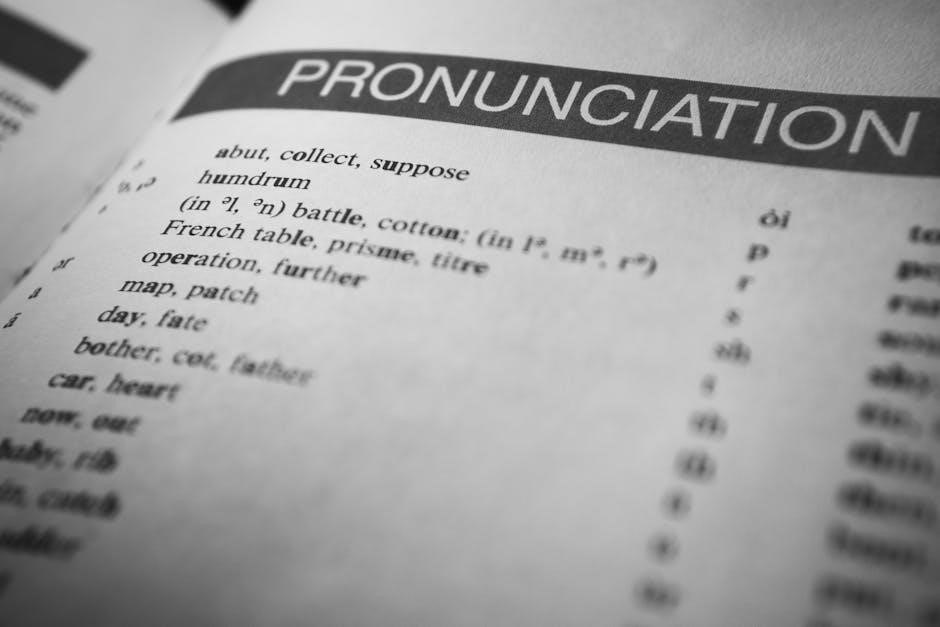The GROL Study Guide 2024-2025 is a comprehensive resource designed to help candidates master the FCC General Radio Operator License exam. It covers essential topics like radio wave propagation, equipment operations, and regulations, providing a structured approach to learning. With expertly crafted content and practice tests, this guide ensures confidence and readiness for the exam.
1.1 Overview of the GROL License
The General Radiotelephone Operator License (GROL) is a credential issued by the FCC, enabling individuals to operate and maintain radio communication systems. It requires passing Elements 1 and 3 exams, covering radio law, regulations, and theory. The license is essential for careers in maritime, aviation, and commercial radio operations, ensuring compliance with federal and international standards.
1.2 Importance of the GROL Study Guide
The GROL Study Guide is a comprehensive resource essential for mastering the FCC General Radio Operator License exam. It provides a structured curriculum, covering key topics like radio regulations, electrical circuits, and safety practices. With practice tests and simulators, the guide helps build confidence and ensures readiness for Elements 1 and 3. It is a vital tool for anyone aiming to succeed in radio communication careers.
1.3 Target Audience for the GROL Study Guide
The GROL Study Guide is designed for aspiring radio operators, maritime professionals, and telecommunications specialists. It caters to individuals seeking to obtain or renew their General Radiotelephone Operator License. The guide is ideal for both newcomers to radio communication and experienced professionals looking to refresh their knowledge of FCC regulations, electrical principles, and operational practices. It serves as a key resource for career advancement in radio-related fields.

Eligibility Criteria for the GROL License
To qualify for the GROL License, candidates must be legal U.S. residents or eligible to work in the U.S., demonstrating English proficiency for radio communication.
2.1 Legal Residency Requirements
Applicants for the GROL License must be legal residents of the United States or eligible to work in the U.S. This requirement ensures compliance with FCC regulations and national security standards. Candidates must provide proof of residency, such as a birth certificate, passport, or valid visa, to meet eligibility criteria for the license.
2.2 English Proficiency for Radio Communication
Proficiency in English is mandatory for the GROL License, as it ensures clear and accurate communication during radio operations. Applicants must demonstrate the ability to receive and transmit spoken messages in English effectively. This requirement is non-waivable and critical for safe and efficient radio communication, particularly in emergency situations. The GROL Study Guide includes resources to help candidates improve their English skills if needed.
2.3 Required Examinations: Element 1 and Element 3
To obtain the GROL License, candidates must pass two written examinations: Element 1 and Element 3. Element 1 focuses on basic radio law and regulations, while Element 3 covers general radiotelephone theory. These exams assess knowledge of legal requirements, operational practices, and technical concepts. The GROL Study Guide provides detailed study materials and practice tests to help candidates prepare for these essential examinations effectively.

Exam Structure and Elements
The GROL exam consists of multiple elements, each focusing on specific areas of radio operation. The study guide provides comprehensive coverage of these elements to ensure thorough preparation.
3.1 Element 1: Basic Radio Law and Regulations
Element 1 focuses on Basic Radio Law and Regulations, covering essential legal and operational standards. The GROL Study Guide provides detailed insights into FCC rules, licensing requirements, and compliance. It emphasizes understanding radio communication laws, operator responsibilities, and international regulations. This section is crucial for building a solid foundation in legal and ethical radio operations, ensuring exam readiness and real-world application.
3.2 Element 3: General Radiotelephone Theory
Element 3 focuses on General Radiotelephone Theory, covering principles of radiotelephone operation, electrical circuits, and digital logic. It explores signal transmission, modulation, and receiver operations. The GROL Study Guide provides detailed explanations and practice questions to master these concepts, ensuring a strong understanding of radiotelephone systems and their practical applications.
3.3 Element 8: Ship Radar Endorsement
Element 8 focuses on Ship Radar Endorsement, covering the basics of radar systems, installation, and maintenance. The GROL Study Guide includes detailed explanations of radar fundamentals, operational procedures, and troubleshooting techniques. Practice questions and real-world scenarios help candidates understand how radar integrates with radiotelephone operations, ensuring compliance with FCC requirements for safe and effective maritime communication.

Core Subjects Covered in the GROL Study Guide
The GROL Study Guide covers essential topics like radio wave propagation, antennas, electrical circuits, and digital logic. It also emphasizes safety practices in radio operations, ensuring a well-rounded understanding of critical concepts.
4.1 Radio Wave Propagation and Antennas
This section explores the fundamentals of radio wave propagation, including how waves travel through different mediums and environmental factors affecting signal strength. It also delves into antenna theory, covering types, designs, and their role in transmitting and receiving signals efficiently. Understanding these concepts is crucial for optimizing communication systems and ensuring compliance with FCC regulations. The guide provides practical insights and examples to aid comprehension.
4.2 Electrical Circuits and Digital Logic
This section covers the basics of electrical circuits, including circuit fundamentals, resistors, capacitors, and inductors. It also introduces digital logic, focusing on basic gates and their applications in radio communication systems. The guide provides practical examples and diagrams to help learners understand circuit analysis and digital principles, essential for troubleshooting and maintaining radio equipment. These concepts are vital for mastering the technical aspects of the GROL exam.
4.3 Safety Practices in Radio Operations
This section emphasizes safety practices essential for radio operations, including proper equipment handling, electrical safety, and emergency procedures. It covers protocols to prevent accidents and ensure compliance with regulations. The guide also addresses environmental hazards and safe installation techniques. Understanding these practices is crucial for maintaining operational integrity and preparing for real-world scenarios in radio communication, as required by the GROL exam.
Practical Aspects of Radio Operation
This section focuses on hands-on skills, including equipment operation, maintenance, and troubleshooting. It provides insights into real-world applications, ensuring a smooth transition from theory to practical radio communication scenarios effectively.
5.1 Equipment Operation and Maintenance
The GROL Study Guide emphasizes understanding and managing radio equipment, including transmitters, receivers, and antennas. It covers routine maintenance, troubleshooting, and safety protocols to ensure optimal performance. Key topics include power supply management, signal transmission quality, and hardware diagnostics. Practical examples and diagrams guide learners in identifying and resolving common issues, ensuring they can operate and maintain equipment effectively for reliable communication.
5.2 Troubleshooting Common Radio Issues
The GROL Study Guide provides detailed strategies for identifying and resolving common radio malfunctions. It covers issues like signal strength problems, interference, and equipment failures. Practical examples and step-by-step solutions help learners diagnose and repair issues efficiently. The guide emphasizes understanding root causes and applying best practices to ensure reliable communication and minimize downtime during operations.

Study Strategies for Success
Master the GROL Study Guide with effective study habits, active learning techniques, and structured schedules. Utilize flashcards, practice tests, and focused review sessions to ensure comprehensive understanding and retention of key concepts.
6.1 Creating an Effective Study Schedule
Develop a structured study plan by breaking down the GROL Study Guide into manageable sections. Allocate specific times for topics like radio laws, electrical circuits, and safety practices. Prioritize challenging areas and incorporate regular practice tests. Schedule review sessions to reinforce learning and ensure consistent progress. A well-organized timeline enhances retention and builds confidence for the FCC exam.
6.2 Using Flashcards for Key Terms
Flashcards are an excellent tool for memorizing key terms and concepts in the GROL Study Guide. Create cards for important definitions, such as FCC regulations, radio theories, and technical terms. Use active recall by quizzing yourself regularly. Digital tools like Quizlet offer pre-made flashcards, making it easy to study on the go. This method reinforces memory retention and helps master complex terminology efficiently.
6.3 Tips for Mastering FCC Regulations
Mastering FCC regulations requires a systematic approach. Start by thoroughly understanding the FCC’s rules and compliance standards outlined in the GROL Study Guide. Break down complex regulations into manageable sections and review them regularly. Utilize FCC question pools and practice exams to test your knowledge. Focus on key areas like operator responsibilities, station requirements, and emergency procedures. Consistent practice and review will ensure a strong grasp of these critical regulations.

Practice Tests and Simulators
The GROL Study Guide includes comprehensive practice tests and simulators, covering Elements 1, 3, and 8, to help build confidence for the FCC exams.
7.1 Benefits of Taking Practice Exams
Taking practice exams is crucial for GROL preparation. These tests familiarize candidates with the exam format, timing, and question types, reducing stress on exam day. By identifying weak areas, practice exams allow focused study, improving overall performance. They also enhance time management skills and build confidence in answering complex questions. Regular practice ensures readiness and mastery of key concepts, leading to better results.
7.2 Navigating Element-Specific Practice Tests
Element-specific practice tests are tailored to address individual sections of the GROL exam, such as Element 1 (Basic Radio Law) and Element 3 (General Radiotelephone Theory). These tests allow candidates to focus on specific areas, improving understanding and retention. By simulating real exam conditions, they help identify strengths and weaknesses, enabling targeted study and enhancing overall exam readiness.
7.3 Utilizing Online Test Simulators
Online test simulators are invaluable tools for GROL preparation, offering realistic exam environments. They provide timed tests, performance tracking, and detailed feedback. Simulators cover all elements, including Element 1 and Element 3, ensuring comprehensive practice. Candidates can identify weak areas and refine their strategies, boosting confidence and readiness for the actual FCC exam.
Additional Resources for GROL Preparation
Supplement your studies with recommended books, online forums, and FCC question pools. These resources offer in-depth knowledge, practical insights, and exam-focused materials to enhance your preparation journey.
8.1 Recommended Study Materials and Books
The GROL Study Guide 2024-2025 is a top resource, offering a detailed curriculum and practice exams. Additionally, the GROL Practice Test Book provides focused Element 1 and 3 questions. Online resources like FCC question pools and exam guides are also essential. These materials ensure a well-rounded preparation, covering topics such as radio laws, circuits, and radar systems. They are designed to simplify complex concepts and enhance exam readiness.
8.2 Online Communities and Forums
Engaging with online communities and forums is a valuable resource for GROL preparation. Platforms like Reddit and specialized radio forums offer interactive learning, real-time support, and shared study materials; Additionally, websites with test simulators and study tools provide hands-on practice. These communities foster collaboration, allowing candidates to discuss challenges and strategies, enhancing their understanding of complex topics like FCC regulations and radio theory.
8.3 FCC Question Pools and Exam Guides
FCC question pools and exam guides are indispensable resources for GROL preparation. They provide authentic exam questions, helping candidates familiarize themselves with the format and content. The FCC Commercial Operator License Program Examinations site offers official question pools, while study guides include practice tests for Elements 1, 3, and 8. These tools ensure thorough preparation and improved readiness for the actual exam.

Understanding Radio Communication Regulations
Mastering FCC rules and international radio regulations is crucial for GROL candidates. The guide covers compliance standards, operational protocols, and legal requirements, ensuring safe and efficient communication practices.
9.1 FCC Rules and Compliance
The GROL Study Guide thoroughly covers FCC rules and compliance, ensuring candidates understand legal standards for radio operations. It includes detailed sections on regulations, operational protocols, and licensing requirements. The guide provides practice tests and exam guides to help master compliance with FCC standards, essential for safe and legal radio communication. This focus ensures readiness for the FCC exams and real-world application of the regulations.
9.2 International Radio Regulations
The GROL Study Guide also addresses international radio regulations, ensuring compliance with global standards. It covers ITU (International Telecommunication Union) rules and cross-border communication protocols. Understanding these regulations is crucial for operators working in international waters or engaging in global radio communications. The guide provides insights into harmonizing FCC rules with international practices, ensuring safe and legal operations worldwide.

Building a Strong Foundation in Radio Theory
The GROL Study Guide emphasizes understanding radio wave propagation, electrical circuits, and safety practices. These core concepts are essential for mastering both basic and advanced radio communication operations effectively.
10.1 Fundamentals of Radio Communication
The GROL Study Guide begins with the basics of radio communication, covering how radio waves propagate, types of transmissions, and essential components of radio systems. Understanding these fundamentals is crucial for mastering advanced concepts and excelling in the FCC exam. The guide simplifies complex topics, ensuring a solid foundation for learners to build upon as they progress through their studies and prepare for real-world applications in radio operations.
10.2 Advanced Concepts in Radiotelephone Operation
The GROL Study Guide delves into advanced radiotelephone concepts, including modulation techniques, signal processing, and system integration. These topics are essential for understanding complex radio operations and preparing for the FCC exam. The guide provides detailed explanations and practical examples, ensuring learners can master these advanced principles and apply them effectively in real-world scenarios, enhancing their proficiency in radiotelephone operations and related technologies.

Radar Endorsement and Ship Operations
The GROL Study Guide covers radar endorsement, focusing on ship radar systems and operational procedures. It prepares candidates for maritime communication, ensuring proficiency in radar operations and FCC exam readiness.
11.1 Basics of Ship Radar Systems
The GROL Study Guide explains the fundamentals of ship radar systems, essential for maritime communication. It covers radar principles, components, and their role in navigation and safety at sea.
Key topics include radar wave propagation, antenna systems, and operational procedures. The guide provides detailed insights and practice questions to ensure mastery of radar endorsement requirements for the FCC exam.
11.2 Operational Procedures for Radar Endorsement
The GROL Study Guide details operational procedures for radar endorsement, focusing on proper system usage, safety protocols, and compliance with FCC regulations. It covers radar system components, installation, and maintenance, ensuring mariners can effectively operate radar equipment. Practical scenarios and practice tests are included to reinforce understanding and prepare candidates for real-world applications in maritime communication.

Final Preparation and Exam Day Tips
Mastering the GROL Study Guide involves managing exam stress, arriving early, and using practice tests to build confidence. Strategies for tackling difficult questions ensure success.
12.1 Managing Exam Day Stress
Managing exam day stress is crucial for optimal performance. Ensure adequate rest, a nutritious meal, and arrive early to avoid last-minute anxiety. Utilize practice tests to build confidence and familiarity with the format; Stay calm, read questions carefully, and allocate time wisely. A well-prepared mindset and organized approach will help you tackle the exam with composure and confidence.
12.2 Strategies for Tackling Difficult Questions
When faced with challenging questions, start by carefully reading the question stem and identifying key terms. Eliminate obviously incorrect answers first, then focus on the remaining options. Use process of elimination and make educated guesses if necessary. Skip difficult questions initially and return to them later to avoid wasting time. Stay calm and methodical to ensure optimal performance.
Benefits of Obtaining the GROL License
Obtaining the GROL license enhances career opportunities in radio communication and operations. It demonstrates expertise, boosts professional credibility, and opens doors to advanced roles in telecommunications and maritime industries.
13.1 Career Opportunities in Radio Communication
Obtaining the GROL license unlocks diverse career opportunities in radio communication, including roles in telecommunications, maritime operations, and aviation. Professionals can work as radio operators, technicians, or managers, ensuring smooth communication systems. The license also qualifies individuals for positions in emergency response, broadcasting, and commercial shipping industries, where reliable radio operations are critical. It enhances employability and opens pathways for advanced roles in the field.
13.2 Enhanced Skills and Knowledge
The GROL Study Guide equips individuals with advanced skills in radio communication, including in-depth understanding of electrical circuits, antennas, and safety practices. It enhances problem-solving abilities through practical examples and expert tips, ensuring mastery of FCC regulations and radio theory. This comprehensive approach fosters technical expertise, enabling professionals to apply their knowledge effectively in real-world scenarios and stay proficient in the evolving field of radio operations.
The GROL Study Guide is a comprehensive tool for mastering radio communication skills and FCC regulations. It equips users with the knowledge and confidence to excel in their careers, fostering continuous learning and professional growth in the field of radio operations.
14.1 Recap of Key Study Guide Elements
The GROL Study Guide provides a comprehensive overview of essential topics, including radio wave propagation, FCC regulations, and radar operations. It features detailed sections on equipment maintenance and troubleshooting, along with practice exams for Elements 1, 3, and 8. The guide also includes study tools like flashcards and online simulators, ensuring thorough preparation for the GROL exam and a strong foundation in radio communication principles.
14.2 Encouragement for Continuous Learning
Continuous learning is vital for mastering radio communication and staying updated with industry advancements. The GROL Study Guide encourages ongoing education by providing resources like practice tests and flashcards. Regular review of FCC regulations and radio theory ensures long-term proficiency. Embrace lifelong learning to enhance your skills, adapt to new technologies, and excel in your career as a licensed radio operator.
Comments